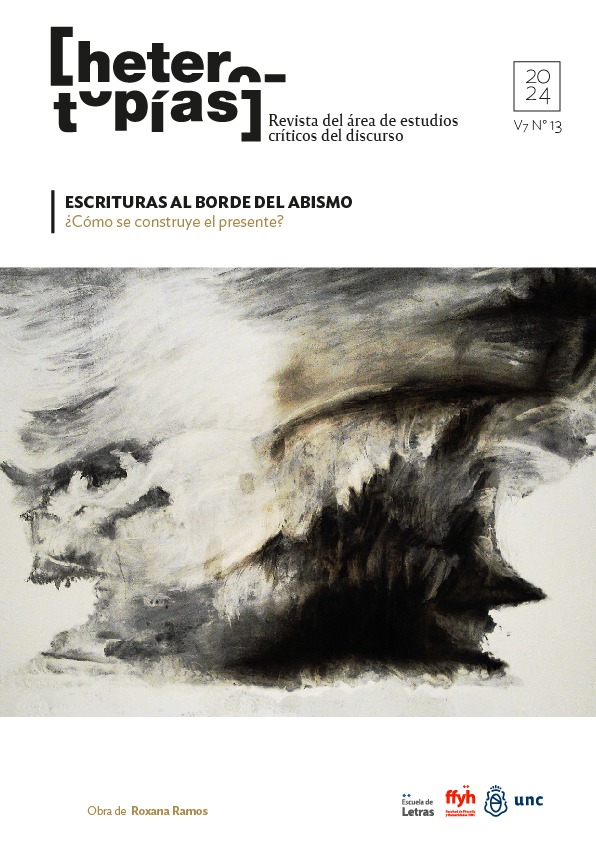Styles, tones and affects: reflections on contemporaneity in Aurora Venturini, Hebe Uhart and Ariana Harwicz
Main Article Content
Abstract
The present works aims to analyze the narratives of Aurora Venturini, Hebe Uhart and Ariana Harwicz as contemporary authors whose styles, tones and affective configurations mark a turning point in literature written by women in the 21st century. From the perspective of gender studies and affect theory, we will seek to reflect on the traits, tones and gestures that make authors participate in the contemporary literary field: the audibility frameworks that value certain affective tones and guarantee public visibility in the recent times, as well as the way in which the styles and tones prioritized by the authors confront traditional narrative structures and social, cultural and gender mandates. These reading operations referring to the narratives of Argentine authors lead to reflection on the political intervention of contemporary feminist literary criticism.
Downloads
Article Details

This work is licensed under a Creative Commons Attribution-NonCommercial-ShareAlike 4.0 International License.
Those authors who have publications with this journal, accept the following terms: Those authors who have publications with this journal, accept the following terms:
a. The authors will keep their copyright and guarantee to the journal the right of first publication of their work, which will be simultaneously subject to the Creative Commons Attribution - Non-Commercial - Share Alike (by-nc-sa) Attribution License; no commercial use of the original work or any derivative works is allowed, the distribution of which must be done with a license equal to the one that regulates the original work.
b. Authors may adopt other non-exclusive license agreements for the distribution of the published version of the work (e.g., deposit it in an institutional telematic archive or publish it in a monographic volume) provided that the initial publication in this journal is indicated.
c. Authors are allowed and recommended to disseminate their work through the Internet (e.g. in institutional telematic archives or on their website) before and during the submission process, which may lead to interesting exchanges and increase the number of citations of the published work. (See The effect of open access).
References
Agamben, G. (2011). Desnudez. Buenos Aires: Adriana Hidalgo editora.
Ahmed, S. (2004). La política cultural de las emociones. Universidad Nacional Autónoma de México.
Ahmed, S. (2019). Fenomenología queer: orientaciones, objetos, otros. España: Bellaterra.
Aira, C. (2016). Sobre el arte contemporáneo/En la Habana. Buenos Aires: Literatura Random House.
Butler, J. (2010). Marcos de guerra: las vidas lloradas. Buenos Aires: Paidós.
Crespi, M. (2020). Tres realismos: literatura argentina del siglo 21. Editorial Nudista.
Contreras, S. (2010). En torno de las lecturas del presente. Los límites de la literatura, 135-153.
Domínguez, N. (2007). De donde vienen los niños: maternidad y escritura en la cultura argentina. Rosario: Beatriz Viterbo Editora.
Domínguez, N. (2020). Acciones colectivas, actos reflexivos: pensando la marea feminista. El lugar sin límites. Revista de Estudios y Políticas de Género, 2(3), 79-91.
Giorgi, G., & Kiffer, A. (2020). Las vueltas del odio: Gestos, escrituras, políticas. Buenos Aires: Eterna Cadencia.
Giunta, A. (2014). ¿Cuándo empieza el arte contemporáneo? / When Does Contemporary Art Begin? Ciudad Autónoma de Buenos Aires : Fundación arteBA.
Harwicz, A., Gomez Guthart, M. (2020). Desertar. Buenos Aires: Mardulce editora.
Harwicz, A. (2022). Trilogía de la pasión. Buenos Aires: Mardulce editora.
Harwicz, A. (2023) El ruido de una época. Buenos Aires: Editorial Marciana.
Kosofsky Sedgwick, E. (2018). Tocar la fibra: Afecto, pedagogía, performatividad. Editorial Alpuerto.
Macón, C. (2021). Desafiar el sentir: feminismos, historia y rebelión. Buenos Aires: Omnívora.
Ostrov, A., Jurovietzky, S. (2023). Historia feminista de la literatura argentina - Escritoras en movimiento. EDUVIM.
Premat, J. (2020). ¿Otros tiempos, otras formas? Encrucijadas de la literatura contemporánea. Mapocho. Revista de humanidades 88, 34-48.
Ribeiro, D. (2020). Lugar de enunciación. Madrid: Ediciones ambulantes.
Salerno, M. P. (2013). La «nueva» narrativa de Aurora Venturini: textos de ayer y de hoy. In III Congreso Internacional Cuestiones Críticas (Rosario, 24 al 26 de abril de 2013).
Salerno, M. P. (2016). El mundo editorial de Aurora Venturini. Revista de Crítica Literaria Latinoamericana, 279-300.
Spang, K. (2006). Acerca de los tonos en literatura. Revista de literatura, 68(136).
Uhart, H. (2019). Cuentos completos. Buenos Aires: Adriana Hidalgo.
Uhart, H. (2019). Novelas completas. Buenos Aires: Adriana Hidalgo.
Uhart, H. (2019). Crónicas completas. Buenos Aires: Adriana Hidalgo.
Vázquez, K. & García, C. (2021). Irreverente y desmesurada: Aurora Venturini frente a la crítica. Valencia: Ediciones Albatros.
Venturini, A. (1991). Las Marías de los Toldos. Buenos Aires: Theoría.
Venturini, A. (1994). La Plata mon amour. Buenos Aires: Pueblo Entero
Venturini, A. (1995). Nicilina y las meninas: cuentos de mogólicos. Buenos Aires: Pueblo Entero.
Venturini, A. (1998). Me moriré en París, con aguacero. Buenos Aires: Corregidor.
Venturini, A. (2003). Nanina, Justina y el doctor Rorschach. Buenos Aires: Dunken.
Venturini, A. (2014). Las primas. Buenos Aires: Literatura Random House.
Venturini, A. (2016). Cuentos secretos. Buenos Aires: Literatura Random House.
Venturini, A. (2020). Las amigas. Buenos Aires: Tusquets Editores.
Venturini, A. (2021). El marido de mi madrastra. Buenos Aires: Tusquets Editores.
Venturini, A. (2021). Nosotros, los Caserta. Buenos Aires: Tusquets Editores.
Venturini, A. (2022). Eva, Alfa y omega y Pogrom del cabecita negra. Buenos Aires: Tusquets Editores.
Venturini, A. (2022). Los rieles. Buenos Aires: Tusquets Editores.
Viola, L. (2023). Esta no soy yo. Biografía de Aurora Venturini. Buenos Aires: Tusquets Editores.
Yelin, J. R. (2020). La vida otra de Hebe Uhart: Pensamiento cínico y sabiduría animal en sus textos tardíos. Cuadernos del Hipogrifo, 13, 9, 112-124.
